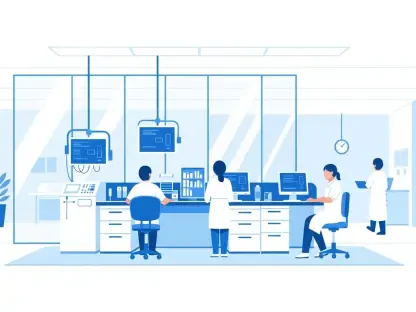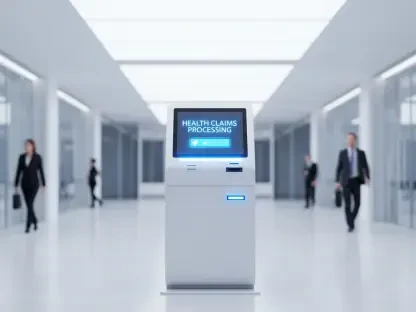Setting the Stage for Innovation in Healthcare Supply Chains
Imagine a hospital facing a sudden shortage of critical medical supplies during a peak patient influx, with caregivers scrambling to locate alternatives while patient care hangs in the balance. This scenario, far too common in today’s healthcare landscape, underscores a pressing need for transformation in supply chain management. The healthcare industry, a cornerstone of societal well-being, relies heavily on the seamless flow of goods, yet persistent inefficiencies and disruptions often jeopardize outcomes. This report delves into a groundbreaking solution poised to address these challenges through cutting-edge technology and strategic collaboration, offering a glimpse into a more resilient future.
The current state of healthcare supply chain management reveals a complex web of stakeholders, from manufacturers to providers, all striving to ensure timely delivery of essential products. Despite advancements, the sector grapples with outdated systems, fragmented communication, and unpredictable disruptions, often worsened by global events or localized demand spikes. These issues not only strain operational budgets but also divert focus from the ultimate goal of patient care, highlighting an urgent need for innovative approaches to streamline processes and enhance reliability.
Analyzing the Healthcare Supply Chain Landscape
Persistent Challenges and Industry Dynamics
The healthcare supply chain plays a pivotal role in supporting patient care by ensuring that hospitals and clinics have access to necessary tools, medications, and equipment. However, inefficiencies such as delayed shipments, stockouts, and poor visibility into inventory levels continue to plague the industry. These problems create ripple effects, burdening clinical staff with additional administrative tasks and compromising the quality of care delivered to patients.
Key players like Medline, a leading distributor of medical supplies, have long been at the forefront of addressing these systemic issues. Alongside emerging technologies, particularly artificial intelligence (AI), there is a noticeable shift toward leveraging data-driven insights to predict and mitigate disruptions. Partnerships between supply chain experts, healthcare providers, and technology giants are becoming increasingly vital, fostering an environment where innovation can thrive and directly impact operational success.
The Role of Collaboration in Driving Progress
Collaboration has emerged as a cornerstone of modern supply chain solutions, bringing together diverse expertise to tackle multifaceted challenges. The combined efforts of industry leaders and tech innovators are paving the way for tools that not only address immediate logistical hurdles but also lay the groundwork for long-term resilience. This trend reflects a broader recognition that no single entity can solve these problems in isolation, emphasizing the power of shared goals and resources.
Unveiling a Transformative AI Solution
The Collaborative Force Behind Mpower
A significant stride in this direction comes through the partnership between Medline, Northwestern Medicine, Providence, and Microsoft, culminating in the development of Mpower, an AI-powered supply chain platform. This alliance unites Medline’s deep expertise in healthcare distribution with the clinical insights of prominent providers and Microsoft’s technological prowess. Together, these organizations aim to redefine how supply chains operate within the healthcare sector, focusing on efficiency and patient-centric outcomes.
The shared vision driving this initiative prioritizes creating a system that is both resilient and intuitive, ensuring that logistical challenges do not overshadow the mission of delivering high-quality care. By pooling their strengths, the partners have crafted a platform designed to anticipate needs, streamline processes, and empower healthcare professionals to focus on what matters most. This collaborative spirit sets a precedent for how strategic alliances can address industry-wide pain points.
Core Technology and Key Features
Mpower is built on the robust foundation of Microsoft 365 and Azure AI, integrating advanced capabilities to enhance supply chain operations. A standout feature is its digital control tower, which facilitates real-time product communications, enables swift substitutions, and streamlines approval processes. This centralized hub offers unprecedented visibility, allowing healthcare systems to respond proactively to potential disruptions.
Beyond its technical sophistication, the platform emphasizes accessibility, ensuring that healthcare organizations of varying sizes can adopt it with ease. Simplicity and reliability are at the core of its design, addressing the diverse needs of hospitals and clinics while maintaining a user-friendly interface. This focus on inclusivity ensures that even smaller facilities can benefit from cutting-edge tools without facing steep learning curves or resource constraints.
Addressing Longstanding Supply Chain Obstacles
Identifying Core Issues in Healthcare Logistics
Healthcare supply chains have long been hampered by issues such as unexpected supply interruptions and operational bottlenecks. These disruptions often result from poor forecasting, inadequate communication between stakeholders, and reliance on manual processes that fail to scale with demand. The consequences are felt directly by caregivers, who must navigate these challenges while maintaining focus on patient needs.
The financial implications are equally significant, as inefficiencies drive up costs and erode budgets that could otherwise be allocated to improving care delivery. With the industry under constant pressure to optimize resources, there is a clear imperative to adopt solutions that can predict issues before they arise and offer actionable insights to mitigate risks. This is where technology-driven interventions hold immense promise.
Mpower’s Strategic Response to Challenges
Mpower’s AI-driven approach directly targets these pain points by automating critical workflows and enhancing decision-making through predictive analytics. By analyzing vast datasets, the platform identifies potential shortages or delays, enabling proactive measures that keep operations running smoothly. This reduces the administrative burden on healthcare staff, allowing them to dedicate more time to direct patient interaction.
Moreover, the system fosters better collaboration among suppliers, providers, and other stakeholders by providing a unified platform for communication and coordination. This interconnected framework minimizes misunderstandings and ensures that essential supplies are available when and where they are needed. The result is a more agile supply chain capable of adapting to dynamic conditions without compromising care quality.
Navigating Regulatory and Compliance Hurdles
Understanding the Regulatory Environment
The integration of AI into healthcare supply chains must contend with a stringent regulatory landscape, where data security and adherence to industry standards are paramount. Regulations governing patient information and operational protocols require meticulous attention to ensure that technological solutions do not introduce vulnerabilities. Compliance is not merely a legal obligation but a critical component of maintaining trust across the ecosystem.
Healthcare organizations must also balance innovation with accountability, ensuring that new tools align with established guidelines while delivering measurable benefits. This dual focus presents a unique challenge, as rapid advancements in AI often outpace the development of corresponding regulatory frameworks. Navigating this terrain demands a commitment to transparency and robust safeguards.
Ensuring Security and Compliance with Mpower
Mpower addresses these concerns by embedding security features and compliance mechanisms into its core architecture. Designed to meet rigorous industry standards, the platform prioritizes the protection of sensitive data while facilitating seamless operations. This balance ensures that healthcare systems can adopt AI solutions without risking regulatory infractions or data breaches.
The emphasis on reliability extends to its operational framework, which undergoes continuous evaluation to align with evolving requirements. By fostering a secure environment, Mpower enables organizations to embrace innovation confidently, knowing that patient and operational integrity remain uncompromised. This approach serves as a model for how technology can advance within regulated spaces.
Envisioning the Role of AI in Healthcare Logistics
Current Trends and Growing Reliance on Technology
The healthcare industry’s increasing dependence on AI signals a transformative shift in how supply chains are managed. From predictive analytics to automated inventory tracking, these technologies are reshaping traditional models, offering unprecedented accuracy and efficiency. As adoption grows, the potential to minimize disruptions and optimize resource allocation becomes more tangible, setting a new standard for operational excellence.
Looking ahead, the trajectory suggests even broader integration of AI, with innovations likely to emerge in areas such as demand forecasting and supplier collaboration. Over the next few years, from 2025 to 2027, the market is expected to see significant advancements as more organizations recognize the value of data-driven strategies. This momentum underscores the importance of staying ahead of technological curves to maintain competitive and operational edges.
Collaborative Efforts Shaping the Future
The success of initiatives like Mpower highlights the critical role of partnerships in driving industry-wide change. By combining expertise from diverse fields, these collaborations accelerate the development of solutions that are both innovative and practical. The collective impact of such efforts promises to create a more interconnected and resilient healthcare supply chain landscape, better equipped to handle future challenges.
Beyond immediate applications, the focus on shared innovation paves the way for scalable models that can adapt to varying needs and contexts. This forward-thinking mindset ensures that the benefits of AI extend across the sector, fostering an environment where continuous improvement is not just possible but expected. The ripple effects of these advancements will likely influence related industries as well, amplifying their overall impact.
Reflecting on a Milestone in Healthcare Transformation
The collaborative launch of Mpower by Medline, Northwestern Medicine, Providence, and Microsoft marked a turning point in addressing the systemic challenges of healthcare supply chains. This partnership demonstrated how technology, when paired with strategic vision, could alleviate longstanding inefficiencies and elevate patient care as the central focus. The initiative’s emphasis on accessibility and resilience resonated across the industry, setting a benchmark for future endeavors.
Looking back, the actionable steps taken through this platform underscored a clear path forward for healthcare logistics. Stakeholders were encouraged to invest in similar AI-driven tools, prioritize cross-sector collaboration, and advocate for regulatory frameworks that support innovation without sacrificing security. These efforts laid a foundation for sustained progress, ensuring that the lessons learned could inform broader adoption and inspire confidence in technology’s role within healthcare.
The journey also illuminated the importance of scalability, urging smaller organizations to explore tailored solutions that mirrored Mpower’s inclusive design. By fostering a culture of adaptability and shared learning, the industry moved closer to a future where supply chain disruptions no longer dictated patient outcomes. This milestone served as a reminder that collective action and technological advancement remained essential drivers of meaningful change.









